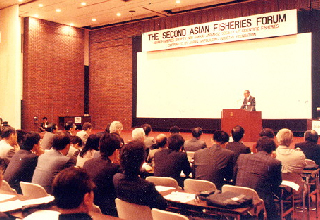 The Japan Branch was established in 1994 with about 100 members from universities, government agencies and companies. All were specialists in different fields of fisheries research, education and development activities.
The Japan Branch was established in 1994 with about 100 members from universities, government agencies and companies. All were specialists in different fields of fisheries research, education and development activities.
Four years after the establishment of the Asian Fisheries Society, the Second Asian Fisheries Forum was held in Tokyo in 1988. This event was the best opportunity to establish the Branch structure, where many Japanese researchers, scientists and professors as well as students majoring in fisheries were given the opportunity to notice the necessity and importance of international communication in fisheries science especially in tropical and subtropical areas.
The Branch processes membership applications to the Society, distributes the Branch newsletters, The Branch organized the International Seminar on Aquaculture in Asia in August 1997, as the first Branch event. This covered two special topics: (1) Aquaculture in Asia, and (2) Sea Farming in Japan. The following Societies and Organizations provided supports to the Branch: Japan Society for the Promotion of Science (JSPS); Tokyo University of Fisheries; Japan Society of Fisheries Science; Japan Society of Aquaculture and the Japan Society of Fisheries Engineering.
Although the number of the Branch members is rather stable since the beginning, the members have been actively involved in the Society events through the Forum Workshops and Section activities. In the 5th AFF held in Chiang Mai, Thailand in 1998, Japanese participants reached around 80. During the 5th AFF, Prof. A. Kanazawa, one of the founding members of the Japan Branch, was honored to the Gold Medal Award for his contribution to the Kanazawa Foundation. He also received certificate of appreciation from the Society in his death in 2009. His lofty ideal and high integrity are pride of Japanese member.
AFS activities can create the good learning opportunity for the International Cooperation. Branch members are now strongly involved in the coordinating activities with foreign scientists, technical cooperation and international collaboration in fisheries education. Particularly, some members working in higher education bodies have strong interest in international collaboration in higher education in universities and graduate schools in foreign countries. The Japan Branch offers the information and access to them for enhancing the cooperation program with Asian countries through the establishment of the better working mechanisms for collaboration.
AFS activities have created opportunities for international cooperation and many Branch members are now strongly involved in coordinating activities with foreign scientists, including technical cooperation and international collaboration in fisheries education. In particular, some members working in higher education institutions have strong interest in international collaboration with other universities and graduate schools in foreign countries. The Japan Branch offers information and access to these, and enhances the cooperation program with Asian countries through the establishment of the better working mechanisms for collaboration.
The Japan Society of Fisheries Science had the 5th World Fisheries Congress in 2008. Most of the member s of the branch actively joined the congress and supported the organizing committee of the congress and had a meeting concerning future collaboration in fisheries education.
Japan was struck by catastrophic earthquake and tsunami on March 11, 2011, and accidents in Fukushima Atomic Power Plant caused serious social unrest not only in Japan but also in East Asia. Many Japanese scientists labored for clarification of damages of coastal ecosystem, researches concerning diffusion of radioactive substances in aquatic ecosystem, improvement of risk communication system and skill in society, construction of new distribution systems, and improvement of resilience in coastal communities, as well as reconstruction of coastal fisheries industries and communities. Needless to say, disaster itself is tragedy, though it provided good opportunities of problem based learning to Japanese fisheries scientists. Many serious discussions have rose through the process of those researches among fisheries scientists, ecologists, biologists, marine physicists, economist, sociologists, educators and politicians. We can expect creation of new scientific field through those discussions. The new field will contribute sustainable development of fisheries industries and coastal communities, resilience of coastal life and improvement of our quality of life in future world. Several scientific reports of such studies were published in 2012 and many scientific reports will be published within future 2 or 3 years.
The Japan Branch will make efforts to transmit such information to all over the world. International scientific forums are good opportunity for transmission. However, active member of the Japan Branch is recently decreasing and we cannot host international scientific forum independently. The branch requested Japanese Society of Fisheries Science (JSFS) to host 11th Asian Fisheries and Aquaculture Forum in March 2013. JSFS officially decided to announce their candidacy in next council meeting of AFS with condition of one year delay of 11th AFAF, because WFC will be held in Pusan in 2016 and if we hold AFAF in 2016 we cannot expect enough number of participants and AFS will be suffered serious operational damages.
